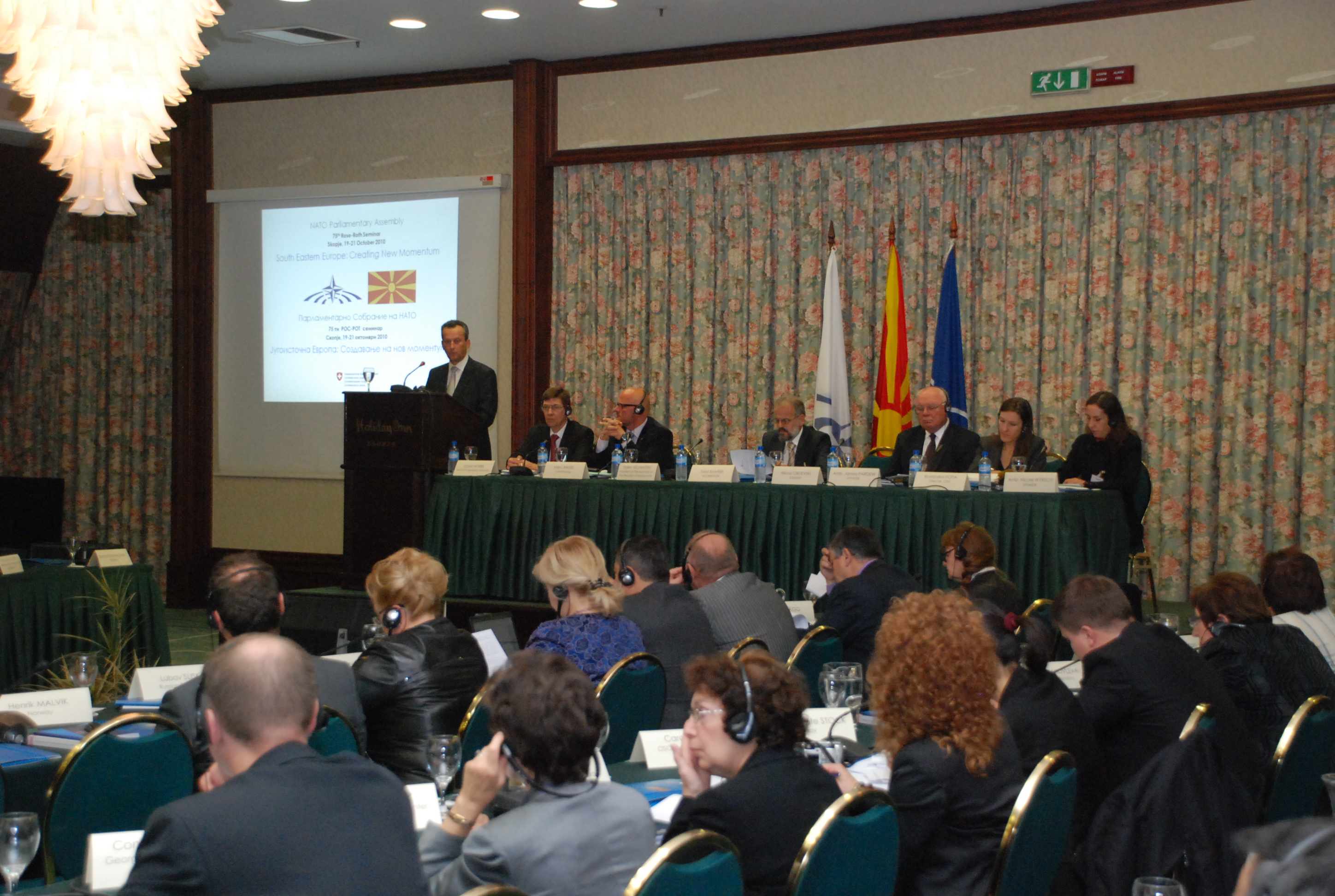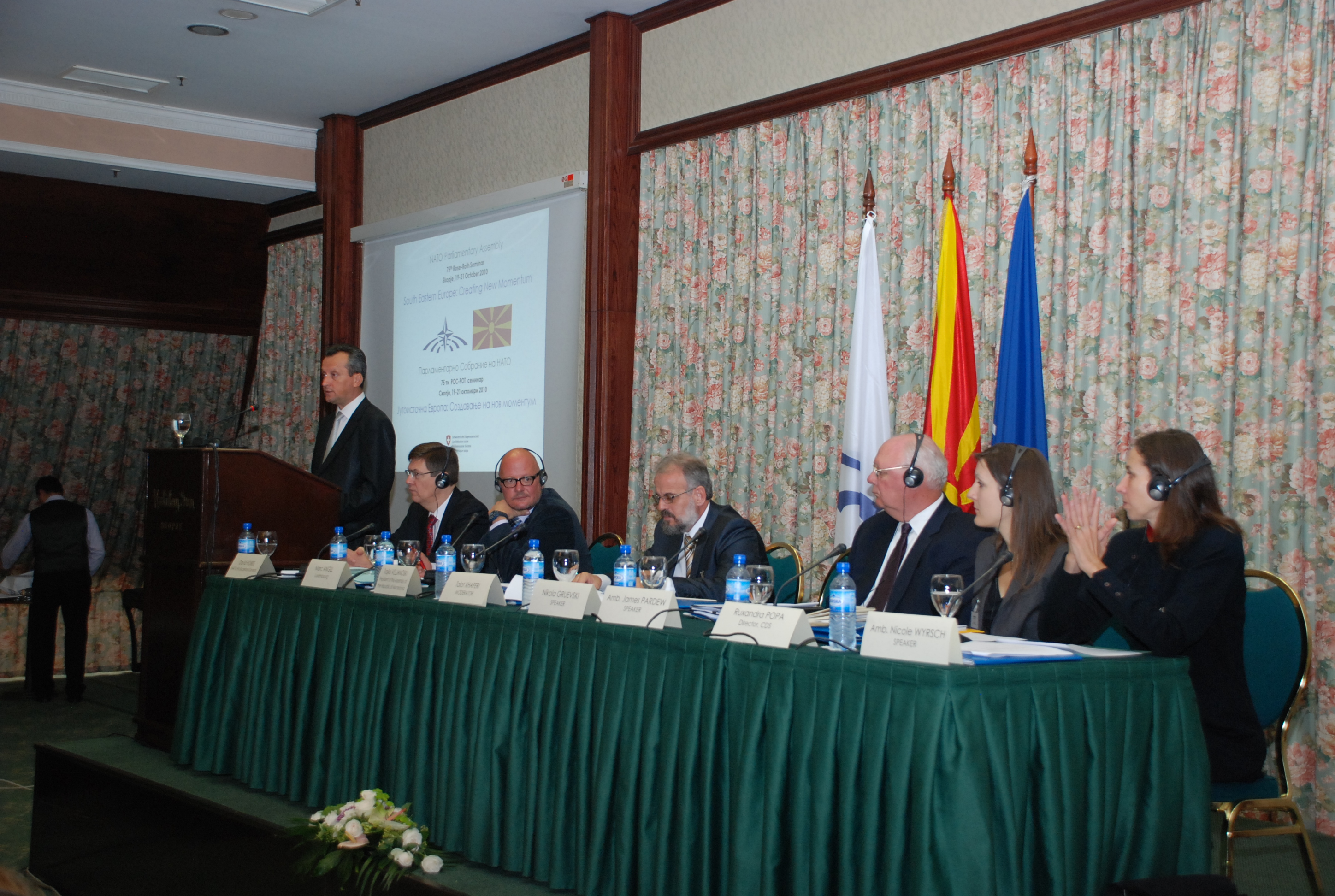Tuesday, 19 October 2010
ADDRESS OF MR. TRAJKO VELJANOSKI, PRESIDENT OF THE ASSEMBLY OF THE REPUBLIC OF MACEDONIA ON THE OPENING OF THE 75TH ROSE ROTH SEMINAR


Distinguished Prime Minister of the Republic of Macedonia,
Distinguished Ministers,
Distinguished colleagues,
Your Excellences,
Ladies and gentlemen,
It is my great pleasure, on behalf of the Assembly of the Republic of Macedonia and on my personal behalf, to welcome you and to wish you successful work during the 75th ROSE-ROTH Seminar.
When we speak about NATO, we usually think of a military organization, a military power, but we all know that NATO has a very significant civil dimension which secures the basic principles and standards of parliamentary democracy, respect of human rights and freedoms, the rule of law, the legal state… Certainly this dimension is manifested through the NATO Parliamentary Assembly, in the framework of which is organized the Rose-Roth Seminar that for the sixth time is held the Republic of Macedonia.
This particular dimension of NATO had a very important role in the processes of transition of the South-Eastern countries, among which is the Republic of Macedonia, after the big changes that happened after the fall of the Berlin Wall
Ladies and Gentlemen,
Since its independence, the Republic of Macedonia is committed to membership in NATO and the EU. Our path towards NATO formally started in December 1993, when the Assembly of the Republic of Macedonia adopted the Resolution for accession to NATO. In December 1995 the Republic of Macedonia joined the “Partnership for Peace” Program, which initiated many intensive reforms, both in the area of defense and security structures, first of all in the Army, but also in other areas.
I believe you all know the overall political and security conditions of the whole region at that time. On its path, the Republic of Macedonia was transformed from a security consumer into a security contributor in the region and wider. In this direction, I would like to mention the participation of our soldiers in the peace mission in Afghanistan, before that in Iraq and in Bosnia and Herzegovina. I believe that you will all agree that the Republic of Macedonia had a very important role in the establishment of stability and security in Kosovo, and today the Republic of Macedonia has a key logistic role for KFOR in Kosovo.
With the establishment of the so called Adriatic Troika (Macedonia, Albania and Croatia), the reforms in the country gained new qualitative dimension aimed at fulfilling all the conditions and criteria for full NATO membership. Unfortunately, at the Bucharest Summit the Republic of Macedonia did not receive the invitation for membership. The reasons for that are well known - the absurd and imposed issue regarding our constitutional name by the Republic of Greece. In Bucharest the other two states from the Adriatic Group, Albania and Croatia, became members of NATO which was a significant step forward in the stabilization of the whole region.
Ladies and gentlemen,
I will not speak about the name issue, since it is a well known issue. I would like to underline that after Bucharest the Republic of Macedonia intensively and in a pragmatic way further develops the cooperation with NATO. Also, the Republic of Macedonia is continuing the negotiations under the auspices of the UN for finding a compromised solution for the imposed dispute. I would like to remind you that the Assembly of the Republic of Macedonia has adopted several documents which oblige the Government to continue the negotiations, but at the same time emphasizing that the compromised solution must protect the national, linguistic and cultural identity of the Macedonian nation, and regarding this we have a general political consensus among the political parties, regardless of the ethic belonging and regardless if they belong to the governing or the opposition parties. At the same time, according to the latest opinion polls, over 82% of the citizens support the membership of the Republic of Macedonia in NATO. This clearly demonstrates that the political entities of the Republic of Macedonia and the civil society see that the future of the Republic of Macedonia and the whole region is in the Euro-Atlantic integration.
Distinguished colleagues,
Ladies and gentlemen,
We know that parliaments have a key role in the Euro-Atlantic integrations, especially in the process of harmonization with the European legislation. I would like to remind you that in the EC 2009 Progress Report the Republic of Macedonia received positive assessments regarding the work of the Assembly of the Republic of Macedonia, and I am convinced that the assessment will be same in this year’s report. I say this because during this year, as parliament, we are paying great attention to the issue of implementation of the laws - on the control role of the parliament over the executive. This role is exercised through the scrutiny debates, several of which were already organized by the Assembly. As a novelty in strengthening parliamentary democracy, we recently adopted amendments to the Rules of Procedure according to which the opposition can now propose an item on the agenda on every second session on any topic - the work of the Government or other issue which is considered to be important topic of discussion.
Another dimension I would like to emphasize concerns the international activities of the Assembly of the Republic of Macedonia, the so called parliamentary diplomacy. We have highly developed bilateral relations with our neighbors, except with our southern neighbor, but I hope that this too will be surpassed. These bilateral relations have two aims, first - to promote the overall bilateral relations, and second – out joint commitment to join the Euro-Atlantic structures. In this respect I would like to express pleasure that the Bosnia and Herzegovina and Monte Negro joined the Adriatic Troika, which is an important step for these two countries, as well as for the completion of the Euro-Atlantic integration of the whole region.
As parliament we are also active on multilateral level, accomplishing all the projected obligations. The Republic of Macedonia is holding the Chairmanship with the Council of Ministries of the European Council until the end of October this year. During our Chairmanship our parliament was hosted several important conferences and meetings. Also, we are actively participating in the parliamentary cooperation of the countries from South Eastern Europe, including the cooperation with the NATO Parliamentary Assembly. I am convinced that my colleague, Mr. Talat Xhaferi, the Head of the Delegation to the PA of NATO, will refer more to this issue.
Ladies and gentlemen,
Distinguished colleagues,
The challenges the world is facing: international terrorism, organized crime, trafficking of people, of drugs, are the challenges which concern us all – whether we are small, big, rich or poor. This is why every state and every responsible government must give its maximum in addressing these global threats. This is why the Euro-Atlantic integrations are important for every country, but also for NATO, for EU and for the stability in general.
I believe that this Seminar entitled “Creating a New Momentum” will provide answers and guidelines in this direction, bearing in mind all those open issues which have surpassed the bilateral dimension long time ago.
Ladies and Gentlemen,
I wish you successful work and I wish all our guests a pleasant stay in the Republic of Macedonia.
Thank you.